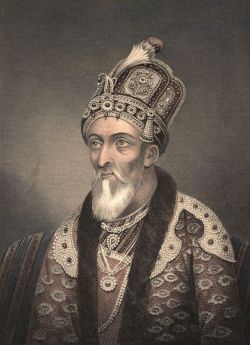Bahadur Shah Zafar: Difference between revisions
No edit summary |
No edit summary |
||
| Line 1: | Line 1: | ||
{{#seo: | {{#seo: | ||
|title=Bahadur Shah Zafar – Last Mughal Emperor of | |title=Bahadur Shah Zafar Biography – Last Mughal Emperor & Poet of Exile | ||
|description=Bahadur Shah Zafar was the last Mughal | |description=Bahadur Shah Zafar was the last Mughal emperor of India, a symbolic figure in the 1857 rebellion, and a noted Urdu poet remembered for his soulful verses. | ||
|image=Bahadur Shah Jafar.jpg | |keywords=Bahadur Shah Zafar Biography, last Mughal emperor, 1857 revolt, Indian history, Urdu poetry, exile in Rangoon, Mughal dynasty, Indian freedom movement | ||
| | |image=https://knowlepedia.org/images/Bahadur Shah Jafar.jpg | ||
}} | |og:type=article | ||
{{Infobox deceased | |og:title=Bahadur Shah Zafar – Last Emperor of the Mughal Dynasty | ||
|og:description=Learn about Bahadur Shah Zafar, the last Mughal emperor who became a poetic voice of loss and resistance during India’s first war of independence in 1857. | |||
|og:image=https://knowlepedia.org/images/Bahadur Shah Jafar.jpg | |||
|twitter:card=summary_large_image | |||
}} {{Infobox deceased | |||
| name = Bahadur Shah Zafar {{Verified}} | | name = Bahadur Shah Zafar {{Verified}} | ||
| image = Bahadur Shah Jafar.jpg | | image = Bahadur Shah Jafar.jpg | ||
| Line 26: | Line 30: | ||
| notable_works = Urdu poetry collections, symbolic role in 1857 revolt | | notable_works = Urdu poetry collections, symbolic role in 1857 revolt | ||
| website = N/A | | website = N/A | ||
}} | }}'''Bahadur Shah Zafar''' (24 October 1775 – 7 November 1862) was the last Mughal Emperor of India. He ruled from 1837 to 1857, largely as a symbolic monarch, while real power had shifted to the British East India Company. He is best remembered for his role as the nominal leader of the Indian Rebellion of 1857 and for his contributions to Urdu poetry. | ||
'''Bahadur Shah Zafar''' (24 October 1775 – 7 November 1862) was the last Mughal Emperor of India. He ruled from 1837 to 1857, largely as a symbolic monarch, while real power had shifted to the British East India Company. He is best remembered for his role as the nominal leader of the Indian Rebellion of 1857 and for his contributions to Urdu poetry. | |||
== Early Life == | == Early Life == | ||
| Line 34: | Line 36: | ||
== Reign and the 1857 Revolt == | == Reign and the 1857 Revolt == | ||
His reign saw little real power, but he was respected for his spiritual and cultural authority. In 1857, Indian sepoys leading a rebellion against British rule declared him their emperor, making him the symbolic head of the revolt. | His reign saw little real power, but he was respected for his spiritual and cultural authority. In 1857, Indian sepoys leading a rebellion against British rule declared him their emperor, making him the symbolic head of the revolt. | ||
== Exile and Death == | == Exile and Death == | ||
After the defeat of the 1857 rebellion, Zafar was captured by the British, tried, and exiled to Rangoon, Burma (now Yangon, Myanmar). He died there in 1862, far from his beloved Delhi. | After the defeat of the 1857 rebellion, Zafar was captured by the British, tried, and exiled to Rangoon, Burma (now Yangon, Myanmar). He died there in 1862, far from his beloved Delhi. | ||
== Legacy == | == Legacy == | ||
| Line 50: | Line 52: | ||
== References == | == References == | ||
<references /> | <references /> | ||
[[Category:Indian poets]] | |||
[[Category:Mughal emperors]] | |||
[[Category:People of the Indian Rebellion of 1857]] | |||
[[Category:1775 births]] | |||
[[Category:1862 deaths]] | |||
[[Category:People from Delhi]] | |||
Revision as of 08:23, 7 August 2025
| Bahadur Shah Zafar | |
|---|---|

| |
| Portrait of Bahadur Shah Zafar | |
| Born | 24 October 1775 |
| Birthplace | Delhi, Mughal Empire |
| Died | 07 November 1862 (aged 87) |
| Place of death | Rangoon, British Burma (now Yangon, Myanmar) |
| Resting place | Zafar Shah Dargah, Yangon |
| Nationality | Indian |
| Occupation | Emperor, Poet |
| Years active | 1837–1857 (as emperor) |
| Known for | Last Mughal Emperor, Leader of the Indian Rebellion of 1857 |
| Notable works | Urdu poetry collections, symbolic role in 1857 revolt |
| Awards | Regarded posthumously as a symbol of resistance |
| Spouse(s) | Zeenat Mahal and others |
| Children | Mirza Mughal, Mirza Khizr Sultan, others |
| Parents | Akbar Shah II (father), Lal Bai (mother) |
| Religion | Islam |
| Website | N/A |
Bahadur Shah Zafar (24 October 1775 – 7 November 1862) was the last Mughal Emperor of India. He ruled from 1837 to 1857, largely as a symbolic monarch, while real power had shifted to the British East India Company. He is best remembered for his role as the nominal leader of the Indian Rebellion of 1857 and for his contributions to Urdu poetry.
Early Life
Born in Delhi as the son of Emperor Akbar Shah II, Zafar was not the first choice for the throne but was eventually crowned due to court politics. He was a patron of arts and poetry and composed many Urdu ghazals under the pen name "Zafar".
Reign and the 1857 Revolt
His reign saw little real power, but he was respected for his spiritual and cultural authority. In 1857, Indian sepoys leading a rebellion against British rule declared him their emperor, making him the symbolic head of the revolt.
Exile and Death
After the defeat of the 1857 rebellion, Zafar was captured by the British, tried, and exiled to Rangoon, Burma (now Yangon, Myanmar). He died there in 1862, far from his beloved Delhi.
Legacy
Zafar’s life represents the end of the Mughal dynasty and a significant chapter in India’s colonial history. His poetry continues to be celebrated, and his tomb in Yangon is a pilgrimage site for many.

